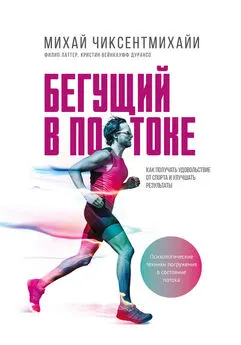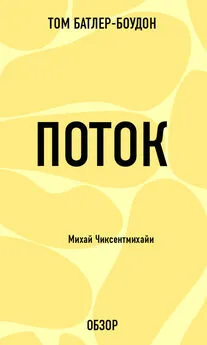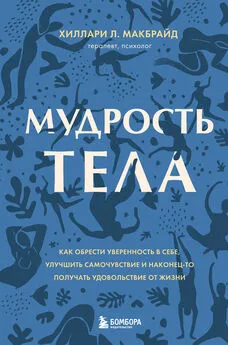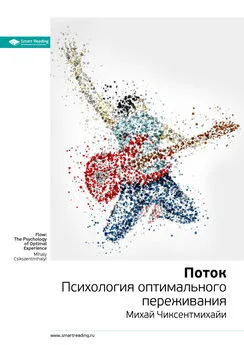Михай Чиксентмихайи - Бегущий в потоке. Как получать удовольствие от спорта и улучшать результаты
- Название:Бегущий в потоке. Как получать удовольствие от спорта и улучшать результаты
- Автор:
- Жанр:
- Издательство:Литагент МИФ без БК
- Год:2018
- Город:Москва
- ISBN:978-5-00100-972-6
- Рейтинг:
- Избранное:Добавить в избранное
-
Отзывы:
-
Ваша оценка:
Михай Чиксентмихайи - Бегущий в потоке. Как получать удовольствие от спорта и улучшать результаты краткое содержание
Люди, которые регулярно испытывают состояние «потока», как правило, живут более счастливой и наполненной жизнью.
На русском языке публикуется впервые.
Бегущий в потоке. Как получать удовольствие от спорта и улучшать результаты - читать онлайн бесплатно ознакомительный отрывок
Интервал:
Закладка:
National Institutes of Health. Mindfulness meditation reduces pain, bypasses opioid receptors. 2016. NCCIH Research Blog: https://nccih.nih.gov/research/blog/mindfulness-meditation-pain.
Smith E.R., Mackie D.M. Social psychology. 3rd ed. Hove: Psychology Press, 2007.
Stavrou N.A., Jackson S.A., Zervas Y., Karteroliotis K. Flow experience and athletes’ performance with reference to the orthogonal model of flow. The Sport Psychologist . 2007, 21(4), 438–457.
Sugiyama T., Inomata K. Qualitative examination of flow experience among top Japanese athletes. Perceptual and Motor Skills . 2005, 100(3), 969–982.
Tang Y., Ma Y., Wang J., Fan Y., Feng S., Lu Q., … Posner M.I. Shortterm meditation training improves attention and self-regulation. Proceedings of the National Academy of Sciences of the United States of America . 2007, 104(43), 1715217156. doi: 10.1073/pnas.0707678104.
Ullen F., de Manzano O., Almeida R., Magnusson P.K.E., Pedersen N.L., Nakamura J., Csikszentmihalyi M., Madison G. Proneness for psychological flow in everyday life: Associations with personality and intelligence. Personality and Individual Differences. 2011, 52, 167–172.
Yerkes R.M., Dodson J.D. The relation of strength of stimulus to rapidity of habit-formation. Comparative Neurology and Psychology. 1908, 18, 459–482.
Csikszentmihalyi M., Rathunde K.R., Whalen S., Wong M. Talented teenagers: The roots of success and failure . N.Y.: Cambridge University Press, 1993.
Csikszentmihalyi M. Finding flow: The psychology of engagement with everyday life . N.Y.: Basic Books, 1997.
Dietrich A., Sparling P.B. Endurance exercise selectively impairs prefrontal-dependent cognition. Brain and Cognition . 2004, 55(3), 516–524. doi: 10.1016/j.bandc.2004.03.002.
Dietrich A., Stoll O. Effortless attention, hypofrontality, and perfectionism. In: B. Bruya (Ed.), Effortless attention: A new perspective in the cognitive science of attention and action. Cambridge: MIT Press, 2010, 159–178.
Dweck C. S. Motivational processes affecting learning. American Psychologist . 1986, 41(10), 1040–1048. doi: 10.1037/0003-066X.41.10.1040.
Elliot A.J., Gable S.L., Mapes R.R. Approach and avoidance motivation in the social domain. Personality and Social Psychology Bulletin. 2006, 32, 378–391.
Goldberg L.R. An “Alternative description of personality”: The big-five factor structure. Journal of Personality and Social Psychology. 1990, 59(6), 1216–1229.
Hanson R. Hardwiring happiness: The new brain science of contentment, calm, and confidence . N.Y.: Crown Publishing, 2013.
Hudson N.W., Fraley R.C. Volitional Personality Trait Change: Can People Choose to Change Their Personality Traits? Journal of Personality and Social Psychology. 2015, 109(3), 490–507. http://dx.doi.org/10.1037/pspp0000021.
Jackson S.A., Roberts G.C. Positive performance states of athletes: Toward a conceptual understanding of peak performance. The Sport Psychologist . 1992, 6(2), 156–171.
McCrae R.R., Costa P.T.J. Personality in adulthood . N.Y.: Guilford, 1990.
Smith E.R., Mackie D.M. Social psychology. 3rd ed. Hove: Psychology Press, 2007.
Strachman A., Gable S.L. What you want (and do not want) affects what you see (and do not see): Avoidance social goals and social events. Personality and Social Psychology Bulletin. 2006, 32, 1446–1458.
Ull е n F., de Manzano O., Almeida R., Magnusson P.K.E., Pedersen N.L., Nakamura J., Csikszentmihalyi M., Madison G. Proneness for psychological flow in everyday life: Associations with personality and intelligence. Personality and Individual Differences. 2011, 52, 167–172.
Baumann N. Autotelic personality. In: S. Engeser, S. Engeser (Eds.), Advances in flow research. N.Y.: Springer Science + Business Media, 2012, 165–186. doi: 10.1007/978-1-4614-2359-1_9.
Baumann N., Scheffer D. Seeking flow in the achievement domain: The achievement flow motive behind flow experience. Motivation and Emotion . 2011, 35(3), 267–284. doi: 10.1007/s11031-010-9195-4.
Boecker H., Sprenger T., Spilker M.E., Henriksen G., Koppenhoefer M., Wagner K.J., Valet M., Berthele A., Tolle T. R. The Runner’s High: Opioidergic Mechanisms in the Human Brain. Cereb. Cortex. 2008, 18(11), 2523–2531. doi: 10.1093/cercor/bhn013.
Csikszentmihalyi M. Toward a psychology of optimal experience. In: L. Wheeler (Ed.), Review of personality and social psychology . Beverly Hills: Sage, 1982, 2, 13–36.
Csikszentmihalyi M., LeFevre J. Optimal experience in work and leisure. Journal of Personality and Social Psychology. 1989, 56(5), 815–822.
de Manzano Ö., Theorell T., Harmat L., Ull е n F. The psychophysiology of flow during piano playing. Emotion. 2010, 10(3), 301–311.
Dietrich A. Neurocognitive mechanisms underlying the experience of flow. Consciousness and Cognition: An International Journal . 2004, 13(4), 746–761. doi: 10.1016/j.concog.2004.07.002.
Dietrich A., Sparling P.B. Endurance exercise selectively impairs prefrontal-dependent cognition. Brain and Cognition . 2004, 55(3), 516–524. doi: 10.1016/j.bandc.2004.03.002.
Dietrich A., Stoll O. Effortless attention, hypofrontality, and perfectionism. In: B. Bruya, B. Bruya (Eds.), Effortless attention: A new perspective in the cognitive science of attention and action. Cambridge: MIT Press, 2010, 159–178.
Dietrich A., Audiffren M. The reticular-activating hypofrontality (RAH) model of acute exercise. Neuroscience and Biobehavioral Reviews. 2011, 35, 1305–1325.
Engeser S., Schiepe-Tiska A. Historical lines and an overview of current research on flow. In: S. Engeser, S. Engeser (Eds.), Advances in flow research . N.Y.: Springer Science + Business Media, 2012, 1–22. doi: 10.1007/978-1-4614-2359-1_1.
Garfield C.A., Bennett H.Z. Peak performance: Mental training techniques of the world’s greatest athletes. Los Angeles: Tarcher, 1984.
Hamilton J.P., Farmer M., Fogelman P., Gotlib I.H. Depressive rumination, the default-mode network, and the dark matter of clinical neuroscience. Biological Psychiatry . 2015, 78(4), 224–230.
Hoff B. Tao of Pooh. N.Y.: Penguin Group, 1982.
Jackson S.A., Ford S., Kimiecik J.C., Marsh H.W. Psychological correlates of flow in sport. Journal of Sport and Exercise Psychology. 1998, 20(4), 358–378.
Jackson S.A., Csikszentmihalyi M. Flow in sports. United Kingdom: Human Kinetics, 1999.
Jackson S.A., Roberts G.C. Positive performance states of athletes: Toward a conceptual understanding of peak performance. The Sport Psychologist . 1992, 6(2), 156–171.
Jackson S.A., Marsh H.W. Development and validation of a scale to measure optimal experience: The Flow State Scale. Journal of Sport and Exercise Psychology . 1996, 1817–1835.
Keller J., Bless H. Flow and regulatory compatibility: An experimental approach to the flow model of intrinsic motivation. Personality and Social Psychology Bulletin. 2008, 34, 196–209. doi: 10.1177/0146167207310026.
Landhäußer A., Keller J. Flow and its affective, cognitive, and performance-related consequences. In: S. Engeser (Ed.), Advances in flow research N.Y.: Springer Science + Business Media, 2012, 65–85. doi: 10.1007/978-1-4614-2359-1_4.
Loehr J.E. How to overcome stress and play at your peak all the time. Tennis . 1984, March, 66–76.
Masters R.S.W. Theoretical aspects of implicit learning in sport. International Journal of Sport Psychology. 2000, 31I, 530–541.
Masters R.S.W., Polman R.C.J., Hammond N.V. ‘‘Reinvestment”: A dimension of personality implicated in skill breakdown under pressure. Personality and Individual Differences. 1993, 14, 655–666.
Maxwell J.P., Masters R.S.W., Eves F.F. From novice to know-how: A longitudinal study of implicit motor learning. Journal of Sports Sciences. 2000, 18, 111–120.
Moneta G.B. The Flow Experience Across Cultures. Journal of Happiness Studies . 2004, 5(2), 115–121. doi: 10.1023/B: JOHS.0000035913.65762.b5.
Pfitzinger P., Latter P. Faster road racing: 5K to half marathon. Champaign: Human Kinetics, 2015.
Ravizza K. A study of the peak experience in sport. Unpublished doctoral dissertation, University of Southern California, 1973.
Ravizza K. Qualities of the peak experience in sport. In: J.M. Silva, R.S. Weinberg (Eds.), Psychological foundations of sport. Champaign: Human Kinetics, 1984, 452–462.
Rheinberg F., Vollmeyer R., Engeser S.. Die Erfassung des Flow-Erlebens [The assessment of flow experience]. In: J. Stiensmeier-Pelster, F. Rheinberg (Eds.), Diagnostik von Motivation und Selbstkonzept. Göttingen: Hogrefe, 2003, 261–279.
Schuler J., Brunner S. The rewarding effect of flow experience on performance in a marathon race. Psychology of Sport and Exercise . 2009, 10(1), 168–174. doi: 10.1016/j.psychsport.2008.07.001.
Takizawa R., Nishimura Y., Yamasue H., Kasai K. Anxiety and performance: The disparate roles of prefrontal subregions under maintained psychological stress. Cerebral Cortex . 2014, 24(7), 1858–1866.
TED. Arne Dietrich TEDx Talk in Beirut. 2011. http://tedxtalks.ted.com/video/TEDxBeirut-Arne-Dietrich-Surfin.
United States Tennis Association. Sports Psychology: Mental skills for achieving optimum performance. 2016. Retrieved from: https://www.usta.com/ImproveYour-Game/Sport-Science/117746_Sports_Psychology_Mental_Skills_for_Achieving_Optimum_Performance.
Wenz B., Henschen K. Sports psychology. From IAAF Medical Manual. Edited by C. Brown. 2012. www.iaaf.org/about-iaaf/documents/medical
Aherne C., Moran A.P., Lonsdale C. The effect of mindfulness training on athletes’ flow: An initial investigation. The Sport Psychologist . 2011, 25(2), 177–189.
Brown K.D., Ryan R.M.. The benefits of being present: mindfulness and its role in psychological well-being. Journal of Personality and Social Psychology. 2003, 84(4), 822–848.
Clarey C. Their Minds Have Seen The Glory. New York Times, February 23, 2014, 1–8.
Daniels J. Daniels’ running formula, second edition. Champaign: Human Kinetics, 2004.
Davis D.M., Hayes J.A. What are the benefits of mindfulness? A practice review of psychotherapy-related research. Psychotherapy . 2011, 48(2), 198–208. doi: 10.1037/a0022062.
Dietrich A. Personal correspondence. 5 Jan 2016.
Epstein D. The sports gene. N.Y.: Current, 2013.
Garfield C.A., Bennett H.Z. Peak performance: Mental training techniques of the world’s greatest athletes. Los Angeles: Tarcher, 1984.
Johnson S. The works of Samuel Johnson, LL.D. Volume II. N.Y.: Alexander V. Blake Publishers, 1840.
Jung A.P. The impact of resistance training on distance running performance. Sports Medicine. 2003, 33(7), 539–552.
Keller J., Landhäußer A. The flow model revisited. In: S. Engeser (Ed.), Advances in flow-research. N.Y.: Springer, 2012, 51–64.
LeVan A.J. Seeing is believing: The power of visualization. Psychology Today Online. 2009. https://www.psychologytoday.com/blog/flourish/200912/seeing-is-believing-the-power-visualization.
Locke E.A., Latham G.P. Building a practically useful theory of goal setting and task motivation: A 35-year odyssey. American Psychologist . 2002, 57(9), 705–717.
Читать дальшеИнтервал:
Закладка:



![Данила Кузнецов - Язык кино. Как понимать кино и получать удовольствие от просмотра [litres]](/books/1083613/danila-kuznecov-yazyk-kino-kak-ponimat-kino-i-pol.webp)




